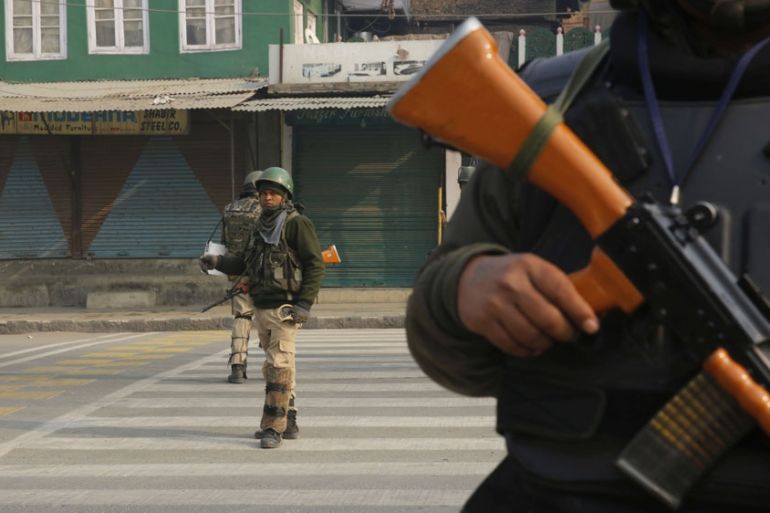Kashmir’s chief minister urges dialogue with Pakistan
The call for talks by Mehbooba Mufti raises questions about the tough policies being pursued by Indian PM Modi.

Srinagar, Indian-administered Kashmir – Chief minister of Indian-administered Kashmir, Mehbooba Mufti, has urged dialogue with Pakistan after a spate of deadly attacks on army installations in recent months.
Mufti, who runs the regional government in alliance with the right-wing Bharatiya Janata Party (BJP), recently said that there was no other option to stop the “bloodshed” in the Himalayan region in the wake of a brutal attack on an army base in Jammu city.
“We have fought three wars (in 1947, 1965 and 1971) and have won all of them, even the [1999] Kargil war. But our basic problem has not been resolved. There is no alternative to talks,” Mufti told the state assembly.
But the BJP has scoffed at the idea of dialogue with Pakistan, whom it accuses of arming and supporting armed rebels fighting against Indian rule.
“It is not suitable at a time when Pakistan is openly supporting militant attacks in the state,” Sunil Sethi, a local BJP leader told Al Jazeera. “I believe there have to be tougher military measures to deal with the situation on the border, as only talks will not stop the killings.”
“Pakistan is sending a large number of militants to Kashmir, and any possibility of talks will mean encouraging their activities.”
Sheikh Showkat Hussain, an academic in Kashmir, questioned Mufti’s sincerity in calling for talks.
“Mufti is the part of the coalition. Instead of issuing a statement, she should ask the central government to initiate the dialogue. She is saying it to save her constituency in Kashmir,” he said.
Critics, however, say the hardline policy adopted by the central government of Prime Minister Narendra Modi since he came to power in 2014 has failed as the disputed state has descended into a low-intensity conflict.
The coalition government in Kashmir, comprising Mufti’s People’s Democratic Party (PDP) and the BJP, has failed to improve the security situation and deadly shooting incidents have increased.
Nearly 100 people, including security forces, have been killed, and hundreds have been forced to flee the de facto border (Line of Control) region as cross-border shelling increased in the past three years, shattering a largely-held 2003 ceasefire deal.
But political science professor, Rakesh Sinha, says: “…army must be given a free hand. That’s the only solution.”
“There is no question of dialogue with Pakistan. …. first, they should end the ceasefire violations along LoC,” said Sinha, who also heads a Delhi-based think-tank, India Policy Foundation.
Deepened mistrust
Mistrust and anger aimed at the government have deepened among Kashmir residents as the army adopted tough measures following mass protests in the wake of the killing of rebel commander Burhan Wani in 2016.
More than 200 rebels were killed in the massive offensive called “Operation All Out” in 2017. Perhaps in response, 126 local youths joined armed groups the same year, as revealed by the state government in the state assembly.
“The continuous harassment and the civilian killings forces young, educated boys, to take up arms. They don’t see any future for themselves,” Feroze Ahmad, a 45-year-old resident of south Kashmir, told Al Jazeera.
Villages in southern Kashmir have been the centres of anti-India protests in the past two years. “We want an end to this bloodshed; fathers are forced to carry the coffins of their children,” Ahmad said.
Residents openly oppose and protest the killing of rebels, most of whom are locals, at the hands of security forces, which has led to many civilian casualties during the gun battles.
“Why would people brave the live bullets during gunfights to save the fighters? It only shows that the tougher actions have failed to yield anything,” said 50-year-old Fatima Begum, a resident of Pulwama village.
“The government is not ready to accept the real issues. People are not dying for jobs and development.”
In 2016, following the killing of Wani, the region witnessed a widespread five-month-long uprising.
More than 100 unarmed protesters were killed, and hundreds were blinded by the use of iron pellets fired by security forces to disperse the protests, according to the Jammu Kashmir Coalition of Civil Society, a local human rights organisation.
Nasir Aslam Wani, a senior leader from the main opposition party, National Conference (NC), blamed the PDP-BJP coalition for the “turbulence in the region”.
“The BJP-PDP alliance in the state has never been accepted by the people in Kashmir. The government might say that they have been able to control the law and order situation, but that’s nowhere visible on the ground,” he said.
Last week there was a public outcry after India’s top court stayed a police case against an army officer accused of killing three civilians in a south Kashmir’s Shopian village.
‘Unending dispute’
Since the partition of 1947, the Kashmir dispute has been the bone of contention between India and Pakistan.
In August last year, Indian Home Minister Rajnath Singh said they were looking for a permanent solution to Kashmir, but nothing seems to have changed on the ground.
A dialogue process between 2004 and 2008 started during the tenure of former Prime Minister Atal Bihari Vajpayee but was called off after the 2008 Mumbai attacks.
“After the dialogue [pushed by Vajpayee] ended, there have been hostilities. The situation has become more violent. The two countries need to realise that it is the people of Kashmir who are suffering,” Noor Ahmad Baba, a political scientist at the central university of Kashmir, told Al Jazeera.
“Gun has never solved anything. Peace and dialogue is the way to bring stability. The two states cannot go to war with each other.”